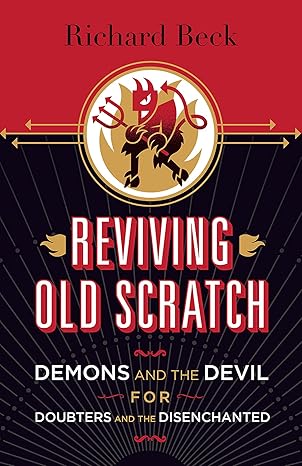Tonight, we begin our reading of Richard Beck’s book Reviving Old Scratch: Demons and the Devil for Doubters and the Disenchanted. We will discuss Chapter 1, “Still Prowling the World,” and Chapter 2, “Scooby-Doo Where Are You!” If you need a book, please let me know. I have attached a copy of these two chapters if you do not have a book yet.
Scooby-Doo: (pp. 13-15)
In this chapter, Beck compares modernity’s disenchantment with the cartoon show, Scooby-Doo, Where Are You! As Beck writes, “The episodes begin with enchantment, with a supernatural monster, specter, ghoul, or ghost. But as the kids investigate, they get suspicious, reason asserts itself, and the monster–the agent of the occult–is eventually revealed to be Mr. Jenkins, the greedy banker. The story ends with disenchantment.” The supernatural is shown not to exist. (The technical term for this is demythologization.) This is the story of the modern world in the last 500 years.
Treading Water: (pp.15-24)
For Christians, it is not simply that our world has been Scooby-Dooed (or demythologized), but we actively want to have an intellectually honest faith. Therefore, we have questions such as how evolution fits with Genesis or how the concept of the soul works with modern neuroscience. p.15. We know that the Earth is not the center of the universe and that germs cause sickness. However, as Beck points out, at the same time that we experience a downward pressure of skepticism and disenchantment, we also experience an updraft of transcendence, such as wonder, awe, and joy. p.16. We are treading water between modern inquiry and traditional faith.
One way to resolve the conflict between faith and doubt without giving up either our religion or our intellectual honesty is to believe as little as possible. p.17. If elements of our faith cause too much doubt or skepticism, the easy out is simply to jettison those beliefs. We can believe in “God” while ridding ourselves of all other supernatural ideas.
Therefore, when we read the Scriptures, we jettison, or at least look past, the supernatural to reveal the human element at the core of the story. p.18. The Scooby-Doo “approach is to look for the Mr. Jenkins part of the story, where the seemingly spiritual problem is actually a human problem.” p.19. Jesus brought real relief to real people; therefore, focusing on the human element keeps the story true but makes it less heavy as an object of belief.
Beck’s other example of treading water is Ephesians 6:11-2 – “For we struggle not against flesh and blood, but against the principalities, against the powers, against rulers of the darkness of this world, against spiritual wickedness in high places.” The Scooby-Doo version of this verse is that in the ancient world, and even today, political power and spiritual power have always been intertwined. Pharaoh was considered a god, and we still sing “God Bless America.” Therefore, to rework Paul just a bit, our struggle is not against flesh and blood individuals, but against this world’s e systemic and structured evils. p.24.
Yes, Social Justice, and . . . : (pp.24-26)
Beck ends his chapter by affirming that a Scooby-Doo reading of the Bible is true – Jesus healed actual people, and we are called to fight against the structural evils of this world. However, a Scooby-Doo reading is too small a vision for our faith and cannot be completely true. p.25. Jesus is clear – his kingdom is not of this world, and he turned down the offer. John 18:36, Luke 4:7. The political is not all there is. Beck gives three reasons why a sole emphasis on social justice is too small.
First, when spiritual warfare is reduced to the political, there is a temptation towards violence, bitterness, and hatred of those on the other side, whom we perceive to be in the wrong or upholding the unjust systems. Jesus teaches that we must love our enemies, bless those who curse us, and put our swords away. Matt. 5:44, John 18:11. “Spiritual warfare isn’t just political engagement; it’s also a journey toward love.” p.25. If our fight is solely of this world, then we necessarily will have a hard time loving those against whom we fight.
Second, if everything is reduced to political action, then things like personal morality and the church get pushed aside. Why waste time and resources on worship when the real struggle is electoral politics? If we are fighting for a more just society, then we should not let morality and holiness stand in the way of the goal.
Finally, a fight for social justice draws us into the pain and suffering of this world. Compassion reveals and leads us into very dark places. The greater our compassion, the greater our doubts and burdens on our faith. We end up with the Epicurean trilemma of how a good, omnipotent god can allow for suffering. In the face of human suffering, we need a “theology of revolt. . . . We need a vision of spiritual resistance and struggle that energizes our faith in the face of pain and suffering.” p.26. The only way to journey towards love in the face of human evil is to have a faith with a fighting spirit.
I hope everyone can join us tonight. Dinner is at 6. The menu is chicken pesto pasta. Discussion about 6:45. Compline is at 8.
Bless those who persecute you; bless and do not curse them. Rejoice with those who rejoice, weep with those who weep. Live in harmony with one another . . . Repay no one evil for evil, but take thought for what is noble in the sight of all. Romans 12:14-17.


Pingback: Reviving Old Scratch – God at War – Ancient Anglican